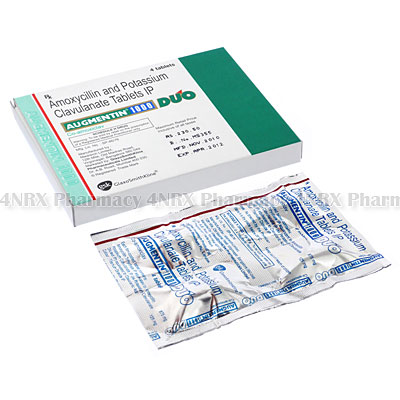 |
Home  Infection Infection  Augmentin 1000 Duo (Amoxycillin Trihydrate/Potassium Clavulanate) Augmentin 1000 Duo (Amoxycillin Trihydrate/Potassium Clavulanate) |
|
|||||||||
|
Augmentin 1000 Duo (Amoxycillin Trihydrate/Potassium Clavulanate)
What is Augmentin 1000 Duo (Amoxycillin Trihydrate/Potassium Clavulanate) used for? Augmentin 1000 Duo (Amoxycillin Trihydrate/Potassium Clavulanate) is a combination of two ingredients. It contains amoxicillin, which is a type of antibiotic that is used to treat bacterial infections such as those occurring in the lungs, skin, sinus and urinary tract. The other ingredient, potassium calvulante is a type of beta-lactamase inhibitor which helps to prevent bacteria from destroying amoxicillin. How should I use Augmentin 1000 Duo (Amoxycillin Trihydrate/Potassium Clavulanate)? Augmentin 1000 Duo (Amoxycillin Trihydrate/Potassium Clavulanate) is a combination of two ingredients. It contains amoxicillin, which is a type of antibiotic that is used to treat bacterial infections such as those occurring in the lungs, skin, sinus and urinary tract. The other ingredient, potassium calvulante is a type of beta-lactamase inhibitor which helps to prevent bacteria from destroying amoxicillin.What are the side effects of Augmentin 1000 Duo (Amoxycillin Trihydrate/Potassium Clavulanate)? Some side effects of Augmentin 1000 Duo (Amoxycillin Trihydrate/Potassium Clavulanate) include:
You should consult your physician if these side effects worsen, or if any other side effects occur. Please Note Strictly follow all instructions provided to you by your physician or pharmacist while using Augmentin 1000 Duo (Amoxycillin Trihydrate/Potassium Clavulanate). Optimum and safe dosage can differ based on the patient and the condition being treated. As this medication may be unsafe for certain patients, it is essential you always inform your physician if you are pregnant or breastfeeding, as well as if you have any allergies, other illnesses, or ongoing health conditions, and if you are taking any other form of medication, supplements, or herbal products. Immediately seek emergency medical care if you have any allergic or hypersensitive reaction. Common signs of a reaction include hives, swelling, skin rashes, chest pains, as well as trouble breathing or swallowing. 
|
|||||||||||||||||